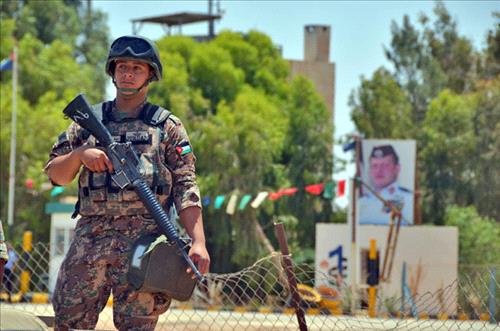Ammon News - AMMONNEWS - Jordan’s foreign policy faced multiple challenges in 2014, and authorities had to multiply their efforts to respond to regional perils during the year, analysts said, agreeing that the country proved a survivor.
Curtis Ryan, a US-based political scientist and Middle East specialist, said Jordan was in a very difficult position in 2014, between wars in Gaza, Syria, internal fighting in Iraq and the rise of the Islamic State (IS), “across not one border, but two”.
“So Jordan as usual had to walk on a tightrope between these issues,” Ryan, who is also a university professor with special interest in Jordan, told The Jordan Times in an interview via e-mail.
Other analysts interviewed also agreed that Jordan continued to play a key role in the region and was even described as the main broker in the Palestinian-Israeli peace process. This role was in the limelight in 2014, especially after the war against Gaza and the Israeli closure of Al Aqsa Mosque.
“Jordan does not interfere in other countries’ internal affairs, but when it comes to the Palestinian issue, it is our issue,” said Minister of Political and Parliamentary Affairs Khaled Kalaldeh.
The official explained that Jordan was sometimes the only voice reminding the world of the Palestinian issue, the two-state solution and the rights of Palestinians to have their own independent state.
This role was more visible in 2014, as countries of the region were struggling with their internal house problems, while Jordan had to maintain its mission of defending the Palestinians’ rights, according to Kalaldeh.
Ibrahim Melhem, a Palestinian analyst echoed Kalaldeh’s remarks.
“Despite the burdens that Jordan has, due to the surrounding turmoil, it was committed to the Palestinian cause, and it was in the lead,” said Melhem, who also works at Palestine TV, adding that last year, Jordan did not spare any diplomatic tool available to advocate the Palestinian rights, including its membership at the United Nations Security Council (UNSC) where Amman called for a ceasefire in Gaza and the opening of Al Aqsa Mosque after its closure by the Israelis.
But according to Ryan, although Jordan has continually called for a real Mideast peace process, it has had no real success getting through to Hamas or to Israel's Likud government, and disaster followed, again.
Syria
Despite the magnitude of the Syrian refugee crisis, Jordan proved its resilience again.
Manar Rashwani, columnist at Al Ghad daily newspaper, said since the start of the Syrian crisis in 2011, Jordan has faced two major challenges, scoring a high degree of success. The first, he said, is dealing with the huge number of Syrian refugees, in addition to preventing the spillover of the crisis into the Jordanian territories, especially through sleeping cells affiliated with the regime or terrorist groups.
Nevertheless, the refugees and terrorists threat challenges became more serious in 2014, Rashwani, an expert in Syrian affairs, explained, blaming that on “the poor response by the international community to the refugee crisis, and more importantly the sudden rise of the IS”, which controls large swathes of Syria and Iraq.
In response to these developments, according to the pundit, Jordan has developed the so-called “cushions policy”, which is based on establishing strong ties with tribes and rebels in the southern part of Syria, by providing inhabitants there with basic needs, mainly food and medical supplies. In return, tribes and rebels take the leading role in securing the Syrian side of the borders, to prevent terrorists from crossing into Jordan, as well as minimising the number of refugees.
Such policy became possible after UNSC Resolution 2165 was adopted on July 14, 2014, drafted by Jordan, Australia and Luxemburg.
Based on this resolution, and for the first time since 2011, the UN humanitarian agencies and their implementing partners were authorised to provide humanitarian assistance to the people in need throughout Syria without the permission of the regime.
Today, as some media reports also suggest, Jordan, in coordination with Russia and Egypt, is playing a vital role in exploring an initiative, based on political solution, to bring the Syrian ordeal to an end, according to Rashwani.
But according to Saad Abu Dayyeh, a political science professor at the University of Jordan, the Kingdom’s ability to influence developments in Syria is not as strong as that of other countries like Iran, and even Iraq.
For Ryan, the rise of IS makes it more pressing security concern to Jordan rather than the unrest in Syria itself.
Ryan said Jordan’s stance towards the Syrian issue is complicated and it was overshadowed by the rise of IS, which is now a more pressing security concern than the Syrian civil war itself.
Iraq and other regional hot spots
The situation in Iraq and the control of Anbar governorate by IS posed a new challenge for Jordan in 2014, and this also led to intensifying Jordan’s efforts towards supporting stability in the eastern neighbouring country.
However, government change in Baghdad helped improve Jordanian-Iraqi relations, according to Ryan and Ibrahim Smaidie, an Iraqi commentator and political analyst based in Jordan.
Smaidie said Jordan has to lead diplomacy again to fight terrorism in Iraq and to have a unified Arab stance regarding Iraq.
He added that Jordan allowing the Iraqi opposition to organise their conference here in 2014 helped in containing the opposition.
According to Mousa Shtaiwi, head of the Centre for Strategic Studies at the University of Jordan, the Kingdom’s non-permanent membership in the UNSC helped deliver Jordan’s messages on regional issues to the world.
*Jordan Times








 comment replay
comment replay 